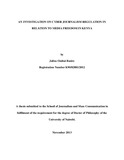| dc.description.abstract | Media freedom has always been tied to responsibilities which journalists are expected to carry for the realisation of societal common good. The emergence of new forms of journalism as a consequence of technological development and appropriations has engendered serious debate about media freedom and the practice of journalism around the world. Cyber journalism poses challenges to media regulatory framework in Kenya. Cyber journalism in this study is defined as the collection, processing and dissemination of information on the cyberspace. Unlike their counterparts in traditional media of newspaper, magazines, radio and television, cyber journalism is not typically or bureaucratically organised. Journalists on the cyberspace seem to ignore professional tenets of accuracy, balance, impartiality, fairness, objectivity and privacy. It is within this milieu that this study investigates freedom of media guaranteed by the Constitution of Kenya 2010 and regulatory challenges posed by cyber journalism. This study contextualises the liberties and limits of media freedom in the constitution. It is guided by the following questions: Why do states commit themselves to freedom of media and under what circumstances is this freedom curtailed? What are the challenges presented by cyber journalism to traditional media regulatory framework and in what manner can they be confronted? The research, which is qualitative in nature, used content analysis and interviews. It analysed secondary documents to obtain data on international law and statutes that govern media freedom and the distribution of content online. Guided by mass society theory and social responsibility theory, the study posits that media regulation is necessary. However, laws regulating journalism should not impede freedom of media and expression which is guaranteed by the Constitution of Kenya 2010 and the International Law. This study concludes that despite the fact that freedom of media is guaranteed by the Constitution of Kenya 2010, this freedom is limited for the sole purpose of protecting other people‘s rights. The study recommends that Internet Service Providers should not be coerced to take responsibility of content online. Bestowing the ownership of content on ISPs will create room for irresponsible cyber journalism leading to anarchy. Future research should be directed towards examining the constitutional provision of the right of access to information. Kenyan parliament passed a law in 2012 on access to information and it is important to know how the legislation impacts on the practice of journalism in Kenya. | en_US |

